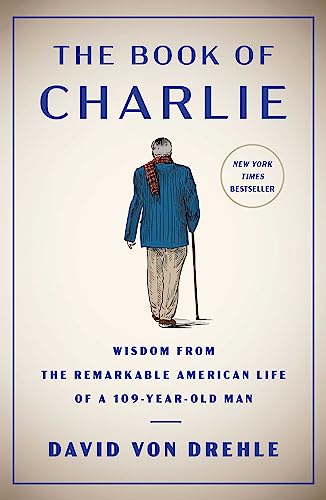The Book of Charlie: Wisdom from the Remarkable American Life of a 109-Year-Old Man

Author David Von Drehle didn’t go looking for Charlie White. He simply had the good luck to move next to Charlie who, when Von Drehle met him in 2007, was 102 years old.
The author recently had left the hustle-bustle of the East Coast and moved to the suburbs of Kansas City, Missouri. He hadn’t lived in his new house for long when, one hot and sweaty Sunday morning, he stepped out to spot his neighbor washing his girlfriend’s car.
His description is priceless: “My neighbor was bare-chested, dressed only in a pair of old swim trunks. With a garden hose in one hand and soapy sponge in the other, he flexed his muscular chest with each splash and swirl, while his wave hair flopped rakishly over one eye. This was Charlie White. Age 102.”
Not only was Charlie debonair, he was also an engaging teller of tales and he had seen a lot. For one thing, he was a doctor and medicine had changed tremendously during the 20th century. Charlie knew that story first-hand.
Von Drehle reminds us that, when Charlie graduated from medical school, there really wasn’t all that much doctors could do. Modern antibiotics and anesthesia had not been invented nor had most of the medicines we take for granted today. Doctors back then could deliver babies and provide the most basic medical care but not much more. By the time the century was over, nearly all of them had become specialists with some capable of revolutionary wizardry like heart transplants.
A writer to his core, Von Drehle knew he had the makings of a terrific story in Charlie White if for no other reason than the man had lived for so long. “An American born in the early 1900s who managed to live into the 2000s would have one foot planted in the age of draft animals and diphtheria—a time when only 6 percent of Americans graduated from high school—and the other planted in the age of space stations and robotic surgery,” he writes. “Such a person would have traveled from The Birth of a Nation to Barack Obama. From women forbidden to vote to women running nations and corporations.”
And so Von Drehle convinced Charlie to tell him his life story and to allow him to write about it. He had Charlie’s cooperation and that of his family.
Von Drehle wanted to know why Charlie, at age 102, was so upbeat and alive. What made him so different than most of his contemporaries. What the author discovered was that Charlie had joie de vivre and, when he encountered setbacks or hardships (his first wife was found dead in a hotel room apparently while having an affair with a man who was never found), he would soldier on. He was what Von Drehle calls “a stoic.”
“The stoics,” the author says, “taught that a life well lived requires a deep understanding of what we control and—more difficult—all that lies beyond our control.”
Charlie had that quality. He let things out of his control slide off his back.
“The lesson, so simple yet so difficult,” Von Drehle writes, “is that life can be savored even though it contains hardship, disappointment, loss, and even brutality. The choice is available to us at every moment.”
This book is peppered with reminisces from Charlie’s colorful life, like the time he and his friends, with no money for train fare, rode on the front of a steam engine to return from California to Kansas City. Another time later in life when Charlie was a doctor, he figured out a way to slow down the blood flow by putting surgical patients in a tub of ice before surgery. This technique allowed surgeons to spend longer operating on the heart.
Of course, this was long before anesthesia. And during his life, Charlie White went from being a country doctor making house calls to becoming of his city’s most called upon anesthesiologists.
What makes Charlie different for Von Drehle, he ultimately concludes, is the way Charlie lived his life with such effortless equanimity. He makes a compelling case and, as you read this book, you might find yourself underlining line after line because Von Drehle, a veteran journalist and storyteller, explains Charlie’s homespun wisdom so well.
“Charlie made an art of living,” Von Drehle writes. “He understood, as great artists do, that every life is a mixture of comedy and tragedy, joy and sorrow, daring and fear. We choose the tenor of our lives from those clashing notes.”
That Charlie did. Astonishingly, he became a volunteer and traveled to Haiti to help with medical care at the age of 99. Just before he died at 109 years old, Charlie jotted down some of what he called his “simple truths.”
Work hard.
Spread joy.
Take a chance.
Enjoy wonder.